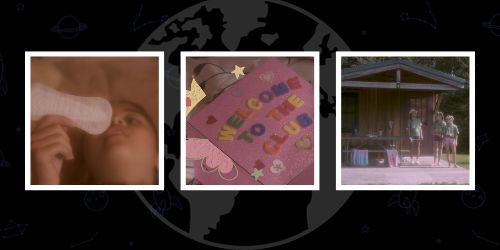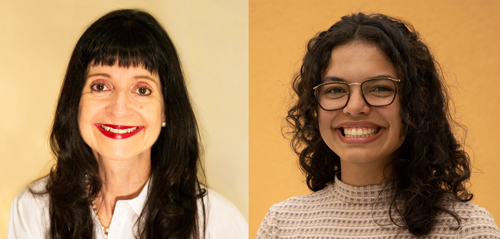Este mês, o público pode filtrar Irmãs de Sangue na Rede Planet Classroom. Este filme tem curadoria da Planet Classroom Network da KIDS FIRST! Festival de Cinema.
Blood Sisters is a coming-of-age short film directed by Anastasia Puertas. Follow Daphne, Ivy, and Hannah at a summer camp as they uplift Daphne during her pivotal introduction to womanhood. This powerful narrative highlights the strength of friendship, bondade, and sisterhood in shaping life’s significant moments.
The film is curated for the Planet Classroom Network by KIDS First! Film Festival.
A Pesquisa Global para a Educação is pleased to welcome Anastasia Puertas.
Anastasia, what inspired you to delve into the theme of adolescence and female bonding in Irmãs de Sangue?
As a young girl, I was afraid of what my period was and how ’embarrassing’ it would be to have. I was a ‘tomboy’ growing up and regularly rejected pink and things I deemed as ‘girly’. Dito isto, I also loved being a girl. So when I came across a funny ad in late middle school that depicted periods as something uncomfortable, but also totally normal and something you can laugh at and bond over, I was sold on this new way of framing periods. I threw my younger cousins ‘first period parties’ where I baked uterus-shaped cakes and encouraged them to talk to me about it if they were ever worried or scared. I wanted to celebrate uncomfortable adolescence because I did not, and still do not, think it should be villainized. Adolescence is something that everyone goes through; it looks different for everyone, but it’s a normal part of growing up, and I think that there is a wealth of knowledge that can be gleaned from this intrinsic part of the human experience. Adolescence is figuring out who we are, making friends, losing friends, lots of change, and I think almost everyone can relate to its highs and lows. That’s what makes me so interested in it and showing it authentically and respectfully. As for female bonding, I am blown away with how powerful sisterhood is, its complexities, and its perseverance. I struggled with making female friends growing up, but sisterhood has always been there. Sisterhood is as small as giving out your last hair tie or as big as telling someone off for hurting your friend. I am inspired to delve into sisterhood because I have seen it time and time again in my life, in the lives of others, and throughout history.
How did you approach creating an authentic and relatable portrayal of such a personal experience for the protagonist?
My first goal in the beginning of the writing process was ensuring the film was authentic and respectful to the ‘first period experience.’ Assim, I made it a point to journal out some of my most distinct memories relating to my tween years and what the start of puberty was like. I dug through old Facebook and Instagram photos, middle-school yearbooks, and diaries to truly remember what it was like to be an 11-year-old me again and thus include my younger self in the process of making this film. My second goal in the writing process was to make the story relatable. So I made it a point to tell everyone I could about it. I informally interviewed female friends and family about their own experiences with their first period and incorporated their feedback as I was developing dialogue and the overall plot. When we got into the rehearsal and production phases of the film, I was also very open to my actresses’ and their parents’ feedback and incorporation of ideas. I wanted to make sure they were comfortable with how I was telling the story and how they could relate or make it their own.
What cinematic techniques or artistic choices did you employ to enhance the film’s message about sisterhood and empowerment?
Most of the set dressing is from my childhood or from the attics of my family friends who had daughters roughly my age. This was done intentionally to be as accurate to my tween years as possible. I also set the story in a summer camp because it is one of the few places in childhood where kids are able to come into their own away from school and their parents (while still in the safety of counselors and staff). I believe that this independence, intrinsic to sleep-away camps, provides a perfect backdrop for empowerment of the characters in the story. They can decide how to help each other, how to operate in a living space with other girls, and how to support each other. They are empowered to create a community in sisterhood of their own choice. The costume choices were also used to enhance sisterhood. Each of the girls has a distinct style in how they wear their hair or what color shorts they choose, or whether they have sporty accessories or earrings or both. I wanted to ensure that each character’s personality shone through in how they dressed themselves. This was then contrasted with their uniformity of the ‘Camp Evergreen’ t-shirt, which is the umbrella of sisterhood and girlness. They are all girls, but being a girl comes in a variety of expressions. They are empowered to express their unique selves while still being girls.
In what ways do you hope Irmãs de Sangue will resonate with audiences, particularly in its portrayal of female relationships and empowerment?
My hope is that Irmãs de Sangue gives another young girl the ‘ah ha’ moment I had in middle school when I watched the funny period ad and made me realize that my period was not the worst thing in the world. Global, I want this film to be educational for those who may not understand the weight of the first period, comforting for those who are currently experiencing that sometimes awkward time of change in their lives, and nostalgic for those of us who remember what it was like getting our period the first time. I want girls to know that they are not alone, that there is a sisterhood out there that understands their struggles, even if they have difficulty with making female friends. I hope to help them feel empowered to reach out to others, build community, and to feel secure in themselves even if they are a ‘tomboy’ or ‘nerdy’ or ‘girly’ because that does not make them any more or less of a girl.
Thank you Anastasia!
CM. Rubin with Anastasia Puertas
Não perca Irmãs de Sangue, agora transmitindo na Planet Classroom Network. This film is curated by KIDS FIRST! Film Festival for the Planet Classroom Network.







Comentários Recentes